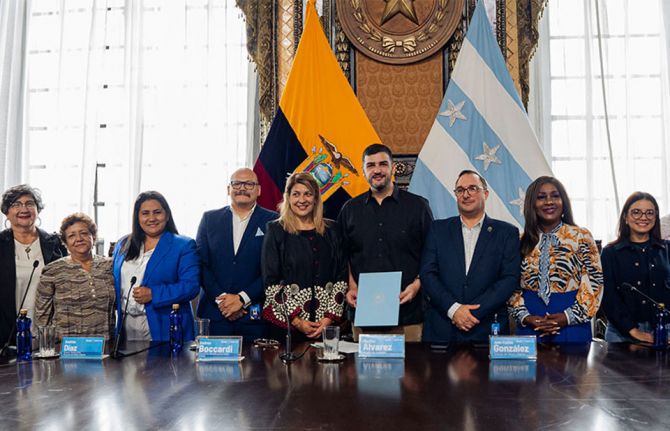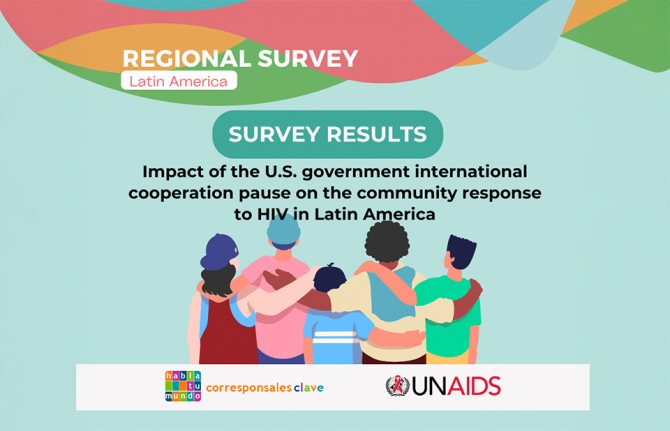

Feature Story
Guayaquil joins the worldwide group of cities committed to ending the HIV epidemic
15 March 2024
15 March 2024 15 March 2024Mayor Aquiles Alvarez Henriques of Guayaquil, Ecuador's largest city and the nation's main port, signed the Paris and Sevilla Declarations on February 28, placing the city among the almost 500 municipalities around the world that are committed to fast-tracking action at local level to improve the quality of life of people living with and affected by HIV. Through this commitment, the city pledges to contribute to the country's goal of ending AIDS as a public health threat by 2030.
Guayaquil is the capital of the province of Guayas, Ecuador's most populated province and the most affected by HIV, with over a third of all new HIV infection notifications in the country, according to the Ministry of Public Health of Ecuador. It has a concentrated epidemic among key populations, with an HIV prevalence of 7.3% among gay men and other men who have sex with men (MSM), for example.
"A significant number of cases reported with HIV in 2023 live in Guayaquil", said Andrés Díaz, Technical Director of the city's Infectious Disease Prevention Unit of the Health and Hygiene Directorate. "We know that the best way to improve HIV prevention is through education and sensitization of citizens so that they can get tested."
Guayaquil has made significant efforts to intensify HIV screening and has increased the detection of HIV-positive cases by 1.6%. Diagnosed people are immediately linked to the public health system to start first-line antiretroviral treatment, which is universally available to nationals and migrants in Ecuador.
Nonetheless, the Health Department of the Guayaquil Municipality has developed a plan with key actions to be implemented as a result of the city’s commitment to the Fast-Track initiative. Some of the most strategic priorities incorporate the scale up of HIV services, including HIV prevention, early diagnosis, and timely treatment of HIV and other sexually transmitted infections; the sensitization of civil servants on issues of stigma, discrimination, and gender-based violence linked to HIV; and facilitate the engagement of communities, specially from key and vulnerable population, in the definition and implementation of HIV programmes at community level.
Representatives of community and civil society organizations such as Corporación Kimirina, the Ecuadorian Coalition of People Living with HIV, and the Silueta X LGBT+ Trans Association attended the event. These organizations play a crucial role in the city's efforts to respond to HIV. "Citizen involvement under the local authority's leadership, with emphasis on the most vulnerable and at-risk community groups, is vital to achieving the goal of ending AIDS by 2030,” emphasized the delegates of Corporacion Kimirina Maria Elena Acosta and Lily Marquez. Similarly, Joan Morales from the Ecuadorian Coalition of People Living with HIV stressed that "By signing the Paris and Sevilla Declarations, Guayaquil joins many other cities that have committed to provide accelerated and sustained health services that allow us to eradicate not only AIDS but also TB, Malaria, and other tropical diseases, with actions that contribute to reducing discrimination towards people living with HIV and other affected communities."
Created in 2014, the Paris Declaration on Fast-Track Cities Ending the HIV Epidemic is a political declaration with commitments and targets that include ending urban AIDS and tuberculosis (TB) epidemics, as well as eliminating viral hepatitis (HBV and HCV). It also articulates a mandate to place people at the center of the response. To define and facilitate that mandate, the Sevilla Declaration on the Centrality of Communities in Urban HIV Responses was created in 2022, outlining the 10 commitments that cities and municipalities are asked to make to increase the engagement of and promote leadership by affected communities in attaining the Fast-Track Cities initiative's goals, objectives, and targets.
"We congratulate the Mayor's Office of Guayaquil for its commitment to contribute to Ecuador’s efforts to reach the 2025 Global AIDS Strategy targets, reducing the number of new HIV infections and AIDS-related deaths and eliminating stigma and discrimination in all its forms,” said Andrea Boccardi Vidarte, Director of the UNAIDS Office for the Andean Countries. "This commitment is also a recognition of the leadership of communities most affected by HIV and their support to the city's goals."


